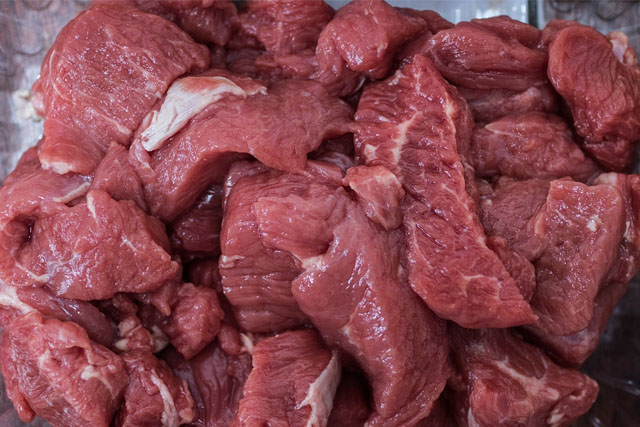



Feeding raw meat to dogs can pose a significant risk of bacterial contamination. Raw meat, especially poultry, can be contaminated with harmful bacteria such as Salmonella and E. coli. These bacteria can cause severe gastrointestinal issues in dogs, leading to symptoms like vomiting, diarrhea, and dehydration. In some cases, these bacterial infections can even be life-threatening.
Is raw meat good for dogs? While raw meat may contain beneficial nutrients, the potential for bacterial contamination is a major concern.
Another risk of feeding raw meat to dogs is the potential for parasitic infections. Raw meat can contain parasites such as Toxoplasma gondii and Trichinella spiralis, which can cause serious health problems in dogs. These parasites can lead to symptoms like muscle pain, fever, and digestive issues. In severe cases, they can even affect the central nervous system and lead to neurological disorders.
Is raw meat good for dogs? While it may provide certain nutrients, the risk of parasitic infections cannot be ignored.
Feeding dogs a diet solely based on raw meat can lead to nutritional imbalances. Dogs require a balanced diet that includes a variety of nutrients, including carbohydrates, fats, proteins, vitamins, and minerals. Raw meat alone may not provide all the necessary nutrients in the right proportions, leading to deficiencies or excesses.
Is raw meat good for dogs? While it can be a source of protein, it should not be the sole component of a dog's diet to ensure proper nutrition.
Feeding dogs raw meat, especially large chunks or bones, can pose a choking hazard. Dogs may swallow large pieces of meat without properly chewing them, leading to blockages in their throat or digestive system. This can be a serious emergency that requires immediate veterinary attention.
Is raw meat good for dogs? While it can be a natural food choice, precautions should be taken to prevent choking hazards.
Feeding dogs raw meat increases the risk of transmitting zoonotic diseases to humans. Zoonotic diseases are infections that can be transmitted between animals and humans. Handling raw meat and coming into contact with the dog's saliva or feces can potentially expose humans to harmful pathogens, including bacteria and parasites.
Is raw meat good for dogs? While it may be suitable for dogs, the potential transmission of zoonotic diseases is a significant concern for human health.
Feeding dogs raw meat can increase the risk of foodborne illnesses. Dogs can become infected with foodborne pathogens through raw meat, leading to symptoms like vomiting, diarrhea, and abdominal pain. These illnesses can be particularly dangerous for puppies, elderly dogs, or dogs with weakened immune systems.
Is raw meat good for dogs? While it may be a natural diet choice, the risk of foodborne illnesses should be considered.
Handling and storing raw meat for dogs can be challenging. Raw meat requires proper handling to prevent cross-contamination with other foods and surfaces. It needs to be stored at the correct temperature to avoid bacterial growth. Additionally, the preparation and storage of raw meat diets can be time-consuming and inconvenient for pet owners.
Is raw meat good for dogs? While it may have its benefits, the handling and storage concerns can make it less practical for many pet owners.
Feeding dogs raw meat does not provide the same dental benefits as chewing on bones or dental treats. Chewing on bones helps remove plaque and tartar from a dog's teeth, promoting better dental health. Raw meat alone does not offer the same level of dental cleaning, which can lead to dental issues such as gum disease and tooth decay.
Is raw meat good for dogs? While it may provide certain nutrients, it does not offer the same dental benefits as chewing on bones.
Feeding dogs a raw meat diet can be expensive and inconvenient for many pet owners. Raw meat can be more costly than commercial dog food, especially if high-quality cuts or organic options are chosen. Additionally, preparing and storing raw meat diets can be time-consuming and require careful planning.
Is raw meat good for dogs? While it may have its advantages, the cost and convenience factors should be considered.
There are alternative options to feeding dogs raw meat that can provide a balanced and safe diet. High-quality commercial dog foods are formulated to meet the nutritional needs of dogs and undergo rigorous testing to ensure safety. These foods often contain a combination of proteins, carbohydrates, fats, vitamins, and minerals to provide a complete and balanced diet.
Is raw meat good for dogs? While it may be an option, alternative options such as high-quality commercial dog foods can provide a safer and more convenient choice.
In conclusion, while raw meat may have certain benefits for dogs, it also poses several potential risks. Bacterial contamination, parasitic infections, nutritional imbalances, choking hazards, transmission of zoonotic diseases, increased risk of foodborne illness, handling and storage concerns, impact on dental health, and cost and convenience factors should all be considered when deciding whether to feed raw meat to dogs. It is essential to consult with a veterinarian to determine the best diet for your dog's specific needs and to ensure their health and well-being.
Leave a Reply
Related posts